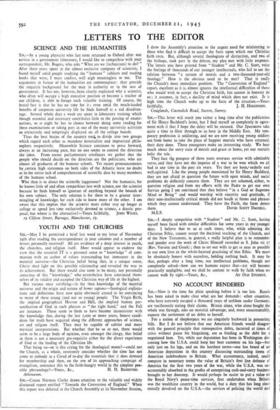LETTERS TO THE EDITOR
SCIENCE AND THE HUMANITIES
SIR,—As a young physicist who last term returned to Oxford after war service in a government laboratory, I would like to sympathise with your correspondent, Mr. Rogers, who asks " What are we (technicians) to do? " After three years spent in the almost exclusive company of scientists, I found myself amid people studying the " humane " subjects and reading books that were, I must confess, well nigh meaningless to me. The arguments in favour of the humanities are commonplace: they provide the requisite background for the man in authority or in the seat of government. It has not, however, been clearly explained why a scientist, who often will occupy a high executive position or become a teacher of our children, is able to forego such valuable training. Of course, the brutal fact is that he has no time for it ; even amid the much-lauded benefits of corporate university life he finds himself at a sad disadvan- tage. Several whole days a week are spent in laboratory training which though essential and necessary contributes little to the passing of exami- nations, so at night he has to choose between doing some reading for these examinations or taking part in one of the many university activities so attractively and temptingly displayed on all the college boards.
Thus the best brains of the country tenet to divide into two groups which regard each other as mundane materialists and impractical philo- sophers respectively. Meanwhile Science continues to press forward, always at an increasing pace, but no one seems to control the direction she takes. From recent parliamentary uttctances we gather that the people who should decide on the direction are the politicians, who are almost all graduates of the humane schools. Yet recent pronouncements by, certain high statesmen on both sides of the Atlantic leave no doubt as to the entire lack of comprehension of scientific data by many members of the humane school.
Who then is to direct the scientific juggernaut? Not the humanist, for he knows little of and often sympathises less with science, nor the scientist because he finds himself so ignorant of anything beyond the bounds of his own subject. The only solution is for there to be a greater inter- mingling of knowledge, for each side to know more of the other. I am aware that this implies that the scientist must either stay up longer at college or spend less time exclusively devoted to science, a drastic pro-






























 Previous page
Previous page